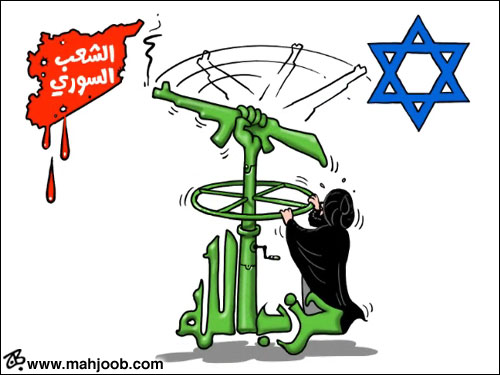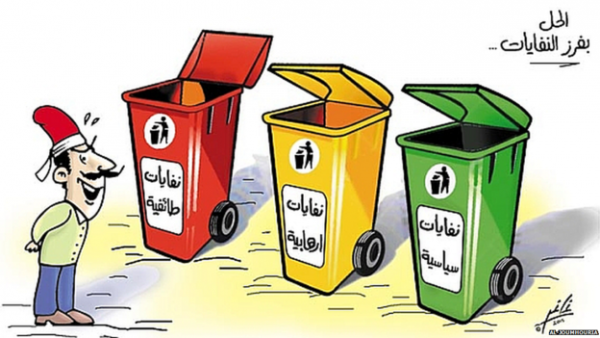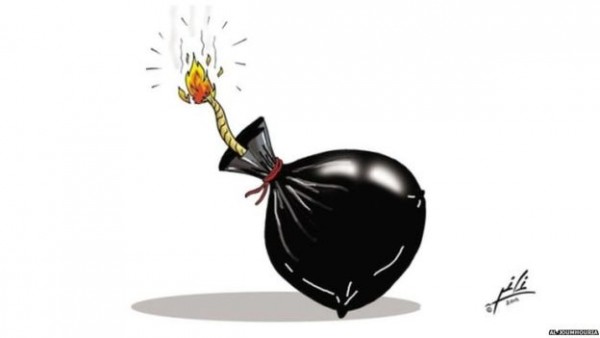By: Joyce Karam
Few are the countries that can promise a Guinness book record for the longest garbage lanes, a two-year vacuum with no president, a dysfunctional government and a parliament that convenes less than ten times a year. Lebanon happens to be that country, staring closely at the abyss, as its GDP growth slumps, and indicators of instability multiply.
Paralysis on every economic, political, and environmental front has defined the situation in Lebanon for the last two years. It is threatening to move the country from fragile stability to sporadic state of instability if the internal and regional polarization continue to dictate the direction of country’s politics.
With more than a million and a half Syrian refugee (37 percent of population), a porous 375-km border with Syria, deepening sectarian Sunni-Shia rift, and a weakening moderate leadership on all sides, the indicators of instability are at their highest mark in Lebanon than they’ve ever been since January 2014.
A more defiant Hezbollah
The conventional wisdom that the war in Syria and its combat and financial toll on Hezbollah would drive it into compromise, is proving to be flat wrong inside Lebanon. Even with an estimate of more than 1200 fighters dead and reports about a serious financial crisis, Hezbollah is only growing more defiant in its home base, and flexing its muscles regionally.
The Hezbollah defiance is most evident in its response to the presidential void in the country. After 635 days with no president, and even when the anti-Hezbollah camp nominated two candidates, General Michel Aoun and MP Suleiman Franjieh, who are strong allies of the party, their candidacy never materialized and the Lebanese militant juggernaut chose to continue with the void.
For Hezbollah, the overarching goals in Lebanon go way beyond the presidency. The compromise from its opponents namely former prime minister Saad Hariri and head of the Lebanese forces Samir Geagea to nominate Hezbollah’s allies Aoun or Franjieh is neither a deal maker nor breaker for the party.
Instead, its strategy appears to be focused on avoiding a larger compromise on the cabinet formation that would accompany the election of a new president. In this context, Hezbollah still rejects the return of Hariri as a prime minister, and is clearly opting for the current status quo of a weak government, rather than a grand bargain with its opponent.

Hezbollah’s hardline position on the Lebanese presidency cannot be seen apart from its escalating rhetoric against Saudi Arabia and other GCC (Gulf Cooperation Council) countries. Following the halt of the Saudi aid to the Lebanese military, and the designation of Hezbollah as a terrorist organization by the GCC states, the party’s leader Hassan Nasrallah delivered a scathing speech, that came very close to declaring war on Riyadh. Nasrallah did not shy away from talking about his party’s role in three regional wars: Syria, Iraq and Yemen.
In essence, Hezbollah today is in the midst of regional polarization between GCC countries and Iran. Instead of formulating a policy to insulate Lebanon, Hezbollah’s intervention in regional conflicts and inability to accept larger compromise in Lebanese politics, is dragging Beirut into the eye of the storm. It’s a lose-lose situation for the Lebanese, who are paying the heavier cost for a tougher GCC policy, and a more bullish Hezbollah.
Threat of radicalization
The polarization inside Lebanon and regionally over politics in Beirut is only prolonging the stagnation and feeding the threat of radicalization inside the country.
Hezbollah’s defiance and rejection of a deal with the strongest Sunni leader today Saad Hariri, is both weakening the former Prime Minister and increasing the Sunni-Shiite rift inside the country. In a recent visit to Washington, an ally of Hariri said on background that his moderate party, the Future Movement, “cannot hold forever the resentment and anger on the street.” He referenced disaffected Sunnis in the far North who are turning to Salafism and extremism because of the toll of the Syrian conflict and in response to Hezbollah’s actions.

Green bin: “Political garbage”; Yellow: “Terrorist garbage ”; Red: “Sectarian garbage”
A military source in the Lebanese Armed Forces (LAF) told me that a major concern is the infiltration of Syrian refugees in Lebanon by extremist groups such as ISIS and Nusra. “Of course we have sleeping cells amongst the refugees” the high-ranking Lebanese officer said, adding that “containment and being vigilant is the only approach we can afford, and we are cognizant of the fact that there will be attempts in the future.”
While the LAF has been receiving steady aid ($75 million annually) from Washington, and has taken a more robust role in stabilizing Lebanon, its capabilities are being challenged by the divisive political environment and the stagnation.
Absent of a grand compromise in Lebanon that would end the Presidential void, produce a functional cabinet and a new parliament, the country is sitting on a ticking bomb as Hezbollah grows more defiant and as the fire goes on with no end in sight in neighboring Syria.
Joyce Karam is the Washington Bureau Chief for Al-Hayat Newspaper, an International Arabic Daily based in London. She has covered American politics extensively since 2004 with focus on U.S. policy towards the Middle East. Prior to that, she worked as a Journalist in Lebanon, covering the Post-war situation. Joyce holds a B.A. in Journalism and an M.A. in International Peace and Conflict Resolution. Twitter: @Joyce_Karam


Leave a Reply
You must be logged in to post a comment.